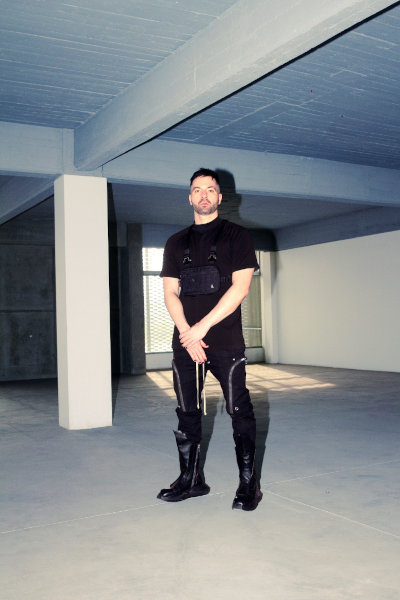 Vampire Weekend's Surprising Jewish Stories
Vampire Weekend's Surprising Jewish Stories


7 min read
Akiva Alpert has always been proud of his unique identity.
Akiva Alpert is a neurodivergent artist who has collaborated with celebrities like Justin Bieber and Billie Eilish. Today, his art shows have been featured throughout the world. His most recent exhibit in Mexico City, called Better Chemicals, is making waves.
Akiva, née Cameron Alpert, was born in Atlanta, Georgia. One of his first memories is when he was at a playground at the Atlanta JCC. He was four years old when a man, unsolicited, walked by the playground and stood outside the fence. He picked up his child and told him to spit on the Jews.
Shortly after, Cameron’s parents moved to Albany, Georgia, where being a Jew was even more uncommon. Cameron was always the token Jew in his class. Despite being a lone wolf, he was proud of his heritage. He remembers approaching friends, saying, “Hey, I am Cameron and I am Jewish.”
When the teachers discovered Akiva was Jewish, they would make antisemitic slurs in front of all the students.
Alpert explains, “That’s all I knew. This is my ethnicity. Initially, friends were cool with it, but then it would get back to a teacher or parent.”
When the teachers discovered Akiva was Jewish, they would make antisemitic slurs in front of all the students. “Who knows what was said behind closed doors. I try not to fixate on it. Sure, it was upsetting, but I just laughed it off. I have always been incredibly proud of my heritage.”
Cameron eventually changed his name to Akiva because his middle name was Yaakov. Akiva is cognate of Yaakov. “I loved it. It was so simple.”
Teachers did not only focus on their disapproval of Alpert’s Jewish identity; they also attacked him for being neurodivergent. One teacher even called him mentally disabled. Akiva was diagnosed with a few comorbidities. He is on the Autistic spectrum, has a motor disorder, ADD and ADHD, and Obsessive-Compulsive Disorder.
Despite these challenges, Akiva was reading at a college level in third grade.

“My brain processes information differently than most people. I am highly receptive to details that others are not even aware of. I also have extreme hypersensitivity to touch, sound and sight. I came to find out that my brain processes a huge amount of stimulus all at once. I noticed my friends would overlook things and I would notice things in the periphery. It was like nails on a chalkboard. Or I would go to a concert without earplugs and I would ask my friends, ‘Why does this not bother you?’”
Despite how others related to him, Akiva never felt victimized. He accepted his differences as part of life and moved on.
“Kids who are out of the box need more support. Instead of saying, ‘Let’s put you in a box,’ they need guidance to do something creative. It is getting better, but it is still not where it needs to be. Ultimately, I am glad that kids are being more open about being on the spectrum. That is just a luxury that I did not have.
“At the time, a teacher could call you ‘stupid,’ or ‘dirty Jew’ and there was no recourse. Now, there are campaigns to counteract this behavior. Back then, I had to just keep it all to myself. There were no [cell]phones, I could not film it or post it anywhere. It all stayed inside. But it certainly was there.”
Akiva believes that in life, you are either learning or assimilating. “Imagine growing up and no one is like you. I look different from other kids, and I am being ridiculed for being Jewish. Lots of kids would say, ‘I just want to fit in.’
“You can either assimilate or go as hard as possible. I have always been proud to be Jewish. No one can take that away from me.”
“It is not in my nature to do that. Instead, I wanted to know everything about my culture and identity. I started researching online, and put pieces together. My family helped as best as they could.
“You can either assimilate or go as hard as possible. I have always been proud to be Jewish. No one can take that away from me.”
Alpert views himself as constantly growing in his Jewish faith. “The evolution is constant. I am as proud as I have ever been of being Jewish. I am always learning more about Judaism. I love to read Kabbalistic and esoteric concepts.”
In 2012, Urban Outfitters came out with a shirt that had a pseudo Star of David, derived from Holocaust imagery. They also had kitschy stuff like shirts that said, Oh, I’m a matzah ball.
“I was wondering, why, when someone is describing Jews, does it always have to be stereotypical? Why is it always about bagels and matzah balls? So, I made streetwear that was serious and Jewish-themed. The stenography was cool. I made T-shirts that attracted good coverage. It was cool and fun. That began that journey. Later, it evolved into more complex pieces and collaborations. The heart of it began with a lot of Jewish substance.”
It took three months for Akiva to release his first line of T-shirts. His brand gained popularity from word of mouth and social media shares. “It was crazy. The Jewish community was super supportive. It was before I was in contemporary art. I just said, ‘Let’s see what happens.’ And a lot of people started wearing it.”
Akiva collaborated on projects with Justin Beiber and Billie Eilish. “I made pieces for them to wear on tour. I have also worked with a ton of influencers, and am big in the rap and pop music scene.”
At present, the bulk of Akiva’s creative focus is on contemporary art. He currently has a pop-up art exhibit in Mexico City, called Better Chemicals.
 Fashion designer and artist Akiva Alpert at a recent popup event.
Fashion designer and artist Akiva Alpert at a recent popup event.
Better Chemicals is a 3-D reconstruction of his body, placed in a metal vacuum frame and suspended from the ceiling in the center of the gallery. It depicts his body being drained of oxytocin through a series of tubes leaving his body. It articulates how Akiva, as a neurodivergent person, experiences love. “There is blue fluid flowing through the tubing and various monitors displaying as if it were a lab showing the extraction of oxytocin. It is all collecting in barrels.
“I’m basically saying to the world: HERE I AM, and THIS is what love is doing to me. It is my metaphor for relationships.”
“Effectively, it is two-fold: instead of saying love is an emotion, I am saying love is a chemical reaction. Neurodivergents experience it more in a logical, not emotional way. Of course, it is an exaggerated reality. Love destroys the body physically and psychologically. Instead of being catastrophic, it has a happy ending. The body transcends and becomes ethereal.”
When asked how love destroys the body, if love is the essence of giving, Akiva admitted it was a good point.
“I consider it incomplete. When you are young and going through relationships, you feel like you are at the behest of your emotions. That is how I felt growing up. The ultimate conclusion is that you can transcend through love. I do believe it is the universal currency.”
